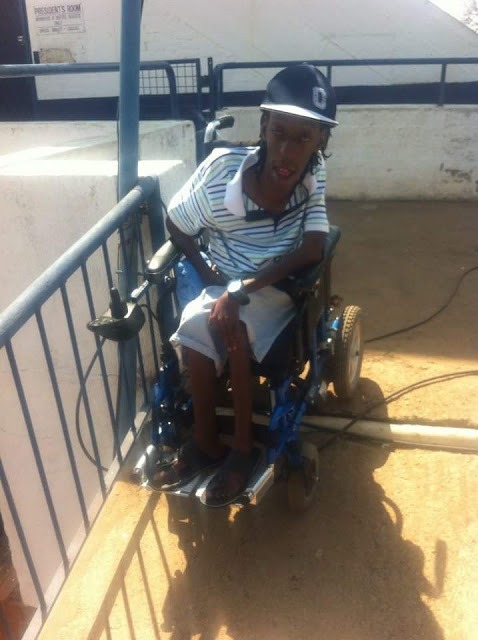
Guest Column: Tsepang T Nare
Daring as he was, young, passionate and enthusiastic he confidently raised his hand in class after the teacher had asked what they all aspired to be when they grew up. His voice so loud and commanding yet pleasing to hear, he said with confidence that he wanted to be a policeman. Out of curiosity, amusement combined with perplexity the teacher asked why.
Clear demonstrating that he knew exactly what he wanted and will stop at nothing to make sure such is made possible, he responded by saying he wanted to be a champion of justice and peace. He went on to utter words that left the teacher gasping for air when he said: “I want to do this for a disabled relative of mine who never got justice.” Young as he was with a disability and dreaming big yet that never came true.
A child with a disability (CWD) in the first developmental stages of life like any other has those wild dreams that he/she believes will take him/her somewhere in life. Those aspirations propel the child to step it up hoping to become a better person who lives a life of fulfilment. It is unanticipated that some of those dreams never come to pass due to the nature of our society that does not embrace diversity as a critical component that leads to unprecedented levels of success, making a life of people with disabilities (PWDs) as one characterised by a multitude of predicaments.
As validated by the National Association of Societies for the Care of the Handicapped (Nascoh) in a 2014 study report, only 2% of the population of PWDs is employed in the public sector while 7% of the population is not employed at all.
Despite efforts to champion for inclusion, equality and creation of an equitable society, when it comes to the disability aspect all still looks doom and gloom. To a greater extent, this is attributed to lack of proper awareness on disability issues resulting in continuous exclusion of PWDs from playing a major and critical role in the political, socio-economic development of the nation. Thus, a notion continues to be peddled that employing such people comes with a number of costs.
The Disabled Persons Act of 1992 section 9(1) states that no employer shall discriminate against any disabled person in relation to the recruitment for employment, or the creation, classification or abolition of jobs or posts.
Subsection 2 then states that an employer shall not be deemed to have discriminated against a disabled person if the disability in question was a relevant consideration in relation to the particular requirements of the employment concerned or special facilities or modifications. It is for such reasons that persons with disabilities find themselves not qualifying to be employed in areas such as the security services, in particular the police force. However, the alarming rate of violence faced by PWDs comparative to justice being served for them is questionable.
- Chamisa under fire over US$120K donation
- Mavhunga puts DeMbare into Chibuku quarterfinals
- Pension funds bet on Cabora Bassa oilfields
- Councils defy govt fire tender directive
Keep Reading
The Health and Child Care ministry’s research on living conditions of PWDs that sought to advance the rights of girls and women with disabilities indicated that girls with disabilities are especially vulnerable to gender-based violence as they are twice as likely to experience sexual abuse relative to their able-bodied male or female counterparts. A report commissioned by Save the Children Norway has also revealed alarming statistics regarding sexual abuse of girls with disabilities.
Some 87,4% of girls surveyed in six provinces between ages of 15-35 had been abused sexually, of which 48% were mentally impaired and 25% were physically impaired. A jaw-dropping 52,4% had tested positive for HIV.
What then makes the degree of vulnerability extreme is that due to visually impairment, the person may need assistance and in the process falls prey. A deaf person may not sense or hear danger looming ahead and as a result the perpetrator takes one’s condition as an advantage. Those with a mental impairment may also not even know that the perpetrator’s actions were a direct violation of their sexual and health rights.
Though efforts have been undertaken to conduct countrywide awareness programmes which includes education on sign language skills, that appears not to have yielded anything as failure to effectively communicate still forms one of the major barriers of communication. Sign language requires practice and takes time to master and effectively communicate using it, not to mention its diversity from one area to another. Meanwhile, due to a mental condition, a person who is mentally impaired is often not regarded as a credible witness.
Thus perpetrators continue to go scot-free. It is for such reasons that I call for an inclusive recruitment process in the police force so as to enable PWDs with requisite skills to be fully integrated in the security services sector working as focal persons to bring in their expertise which will go a long way towards combating and decisively dealing with unbecoming behaviours. There is need to set up a special disability friendly units with personnel well-versed with disability issues which includes excellent sign language skills and a clear understanding of disability at an academic level yet with a broader scope.
Inclusive development using the disability lense seeks to promote and showcase various skills among PWDs that are idle and under-utilised so they can be made use of to enable their unique abilities to manifest so as to transform this nation into an ideal model.
Tsepang T Nare is a disability rights activist. He can be contacted on [email protected].











